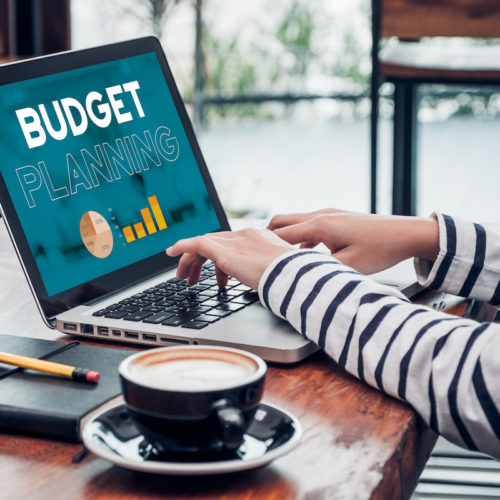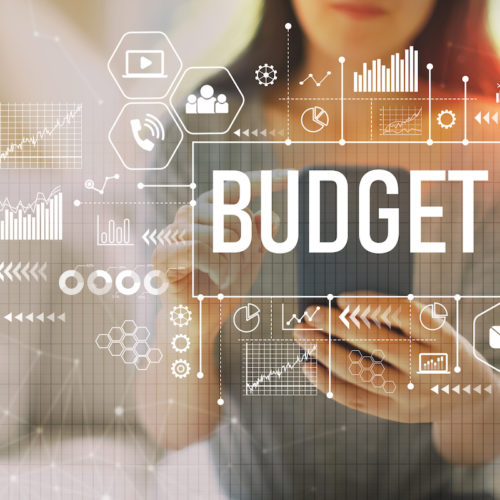Everyone says you should have a budget, and that’s certainly good advice. But if you’ve never had a budget, you may not be entirely sure what it is and what it’s designed to accomplish.
In this article, I’m going to answer the question of what is a budget, talk about why you need one, and share some specific strategies that may work for you.
Part of the issue for a lot of people may be that the term “budget” is thrown around so frequently, and maybe even haphazardly.
We’re always told that budgets don’t work. After all, the federal government virtually never balances its budget, and many businesses frequently come in over budget.
So, if a budget can fail, what’s the point of having one?
What Is A Budget?
Part of the problem with budgeting is that the word “budget” itself has a very clinical meaning. The accounting definition of a budget is both dry and impersonal.
Let’s start with the definition of a budget from Investopedia:
“A budget is an estimation of revenue and expense over a specified future period of time and is usually compiled and re-evaluated on a periodic basis. Budgets can be made for a person, a family, a group of people, a business, a government, a country, a multinational organization or just about anything else that makes and spends money. At companies and organizations, a budget is an internal tool used by management and is often not required for reporting by external parties.”
Does that definition get you excited? Me either. But that’s the kind of stuff you learn in school or read about in the financial press. It’s a valid explanation, but it just doesn’t translate well on a personal level.
So, let’s start by disregarding the organizational meaning of “budget,” and focus on how it can apply to you personally.
Take Control Of Your Finances
At its core, budgeting is about taking control of your money. A recent survey showed that 60% of Americans don’t have as much as $1,000 in savings for an emergency expense.
Having a budget is a critical part of avoiding living in that financial state. A budget is simply a strategy you put in place to make sure you spend less than you earn.
On an individual level, that might mean earning $3,000 per month, and living on $2,500. It may be difficult, but it’s the key to all good financial things in life.
What Is The Purpose of a Budget?
The main purpose of a budget is to gain the upper hand on your financial situation. Living paycheck-to-paycheck, the way most Americans do is not only financially dangerous, but it’s also incredibly stressful. It’s one of the major reasons why stress seems to be a bigger problem now than ever.
There are all kinds of causes for stress, but one of the biggest is financial. The problem is that it’s relentless. It’s not just that you fall behind in one month, but rather that it’s a constant struggle every month. That can wear anyone down.
How To Start the Budgeting Process
In a real way, a budget is like taking a financial timeout. You’ll start the process by doing an in-depth analysis of your current financial behavior. Mostly, that’s about figuring out exactly how you spend the money you do have. And once you do, you’ll be in a better position to evaluate how you can be more efficient with your finances.
A good term I heard that relates to budgeting is “creating margin in your finances.” Like the extra space that surrounds the text on the page of a book, margin is the extra money in your budget. If you don’t have a budget, you probably don’t have any financial margin. The purpose of a budget is to provide exactly that.
Until you implement a budget of your own, it’s highly unlikely you’ll ever make any progress on the financial side of your life.
The Pros & Cons of Having a Budget
Most people focus on the negative side of budgeting, but that’s approaching it entirely from the wrong angle.
The Negatives of Budgeting
- Changing your finances, which is always uncomfortable. And naturally, changes in your finances will inevitably lead to changes in your lifestyle.
- Learning to live on less than you earn. That’s a difficult concept if you’ve never done it before.
- Adopting the discipline to say “no” to yourself and your family when you’re working to justify spending money on a “want” that you’re trying to convert into a “need.”
- The initial sense of a loss of freedom when first implementing your budget.
- Learning to live without those little goodies and indulgences you’ve been treating yourself to over the years.
If you focus on the negatives, you may never start budgeting. But that’s why it’s mission-critical to focus instead on the positives.
The Advantages of Budgeting
- Once you implement a budget, you’ll begin to develop a sense of control over your finances that you’ve never known. It can be incredibly empowering.
- You’ll begin building savings, which will represent tangible evidence of the greater control you’re gaining over your finances.
- If you were in debt when you began budgeting, you’ll begin to see your balances decline – along with your monthly payments on credit cards. You’ll start to realize you can get out of debt.
- When your savings reach a comfortable level, and your debts are well on their way to being paid off, you may begin investing. That’s when you’ll begin creating wealth for the future.
- You’ll come to realize that your budget, as painful as it might be, is creating more options in your life.
- Your stress level will decline, enabling you to sleep better at night and to feel better about yourself.
- As your financial situation begins to improve, you’ll once again be able to indulge yourself in some extras, only this time you’ll do it without guilt.
If you’ve been struggling with starting a budget because of how bad it will feel, change your focus, and think more about how good it will feel when you have it up and running. In other words, focus on the benefits at the end, not the struggles at the beginning.
Short of having a winning lottery ticket or a large inheritance, no one achieves financial independence without an investment of time and effort. And trust me, financial freedom is a worthy goal. But that will never happen until you get control over your budget.
What Are the 3 Types of Budgets?
There are more than three types of budgets, so many in fact that it’s probably impossible to put a number on it. Virtually anyone who knows anything about finance has published a book or an online course to give you their version of the ultimate budget.
But in my experience, three types of budgets are the most effective and will work best for most people.
50-20-30 Budget
We’ll start with this one because it’s the one I like best. The numbers, 50-20-30, represent percentages of your net income allocated to general spending categories.
Those categories are as follows:
- 50% of your after-tax income goes to necessary expenses, like housing, utilities, food, minimum debt payments, insurance premiums, and the like.
- 20% is allocated to savings and/or debt repayment. For debt payment, it represents payments over and above the minimum required monthly payments. The idea is to increase your payments to pay down your debts faster.
- 30% goes to “wants.” These are the extras in life that you don’t need, but you buy them because they make life more pleasant. This category includes vacations, entertainment, concert tickets, sporting events, and going to the movies. You get the picture.
What I like about the 50-20-30 budget is its emphasis on the big picture. Most budgeting methods focus on the details of budgeting, like the individual expense line items. With this method, personal expenses aren’t as necessary. For example, the 30% allocation to wants you can spend any way you choose. You can decide which pleasures you wish to pay for in life, without having to go on the financial equivalent of a diet.
There’s also a lot of flexibility in this budget method. If you can’t fit your necessities neatly in 50% of your after-tax income, you can move some of your allocations from your wants category.
But what I most like about the method is the emphasis on saving money. Most people try to get by saving just 10% or so of their paychecks. That’s certainly a step in the right direction, but in my own experience, you’ll need to save a lot more to build wealth. 20% is the minimum in that direction.
The Envelope Method
Long ago and far away – when people typically paid their bills in cash – many used this method as a standard budgeting procedure. It involved putting actual currency into individual envelopes earmarked for each household expense. It’s conceivable you could’ve had 15 to 20 cash bearing envelopes to match all of your expenses.
A few people still handle their finances that way, but the envelope method has evolved in recent decades.
Though far fewer people put cash in envelopes, the basic methodology remains the same. You set up a budget in which each expense has an “envelope” that you need to fill with sufficient funds to pay the expense it represents. One of the advantages is that if you go over budget in one expense category, you can usually find additional funds from another expense that’s lower than expected.
And for what it’s worth, you don’t need to set up a system of physical envelopes anymore. There are envelope budgeting apps you can use to do it digitally. The most prominent is an app known as Mvelopes. It works by “giving a purpose to each dollar in your budget,” which is precisely what the paper envelope method does. It will enable you to take an old school budgeting system and do it digitally.
Zero-Based Budget
Using the zero-based budget, if you manage your money correctly, your budget will zero out every month. That’s because the method forces you to account for every dollar in your budget. Every dollar must go toward a specific expense, or moved into savings or put toward debt reduction.
The zero-based budget works on the assumption that any money in your budget that doesn’t have a specific purpose is likely to disappear into excess spending. For this reason, it tends to be more restrictive than other budget types. It may best be used if you’ve had difficulty managing your finances in the past, and lack the discipline to handle unallocated funds.
The Importance of Budgeting
Implementing a budget doesn’t have to be – and shouldn’t be – complicated and painful. Sure, it will involve an element of sacrifice at the very beginning. But as each month passes, it should get more comfortable. And as it does, you’ll begin to sense greater control over your finances.
That’s an important point by itself. The whole purpose of implementing a budget is to make you the master of your money, rather than letting your money control you. That’s a worthwhile goal even if you never plan to get rich. But it will be even more critical if you do.
As I’ve discovered in my own life, financial independence is a goal well worth pursuing. It’s not merely about the constant accumulation of more money, but rather one of having progressively greater control over your life.
Having a budget in place will help you move closer toward living the life you’ve always dreamed of living.





Read 1 comment or add your own
Read Comments